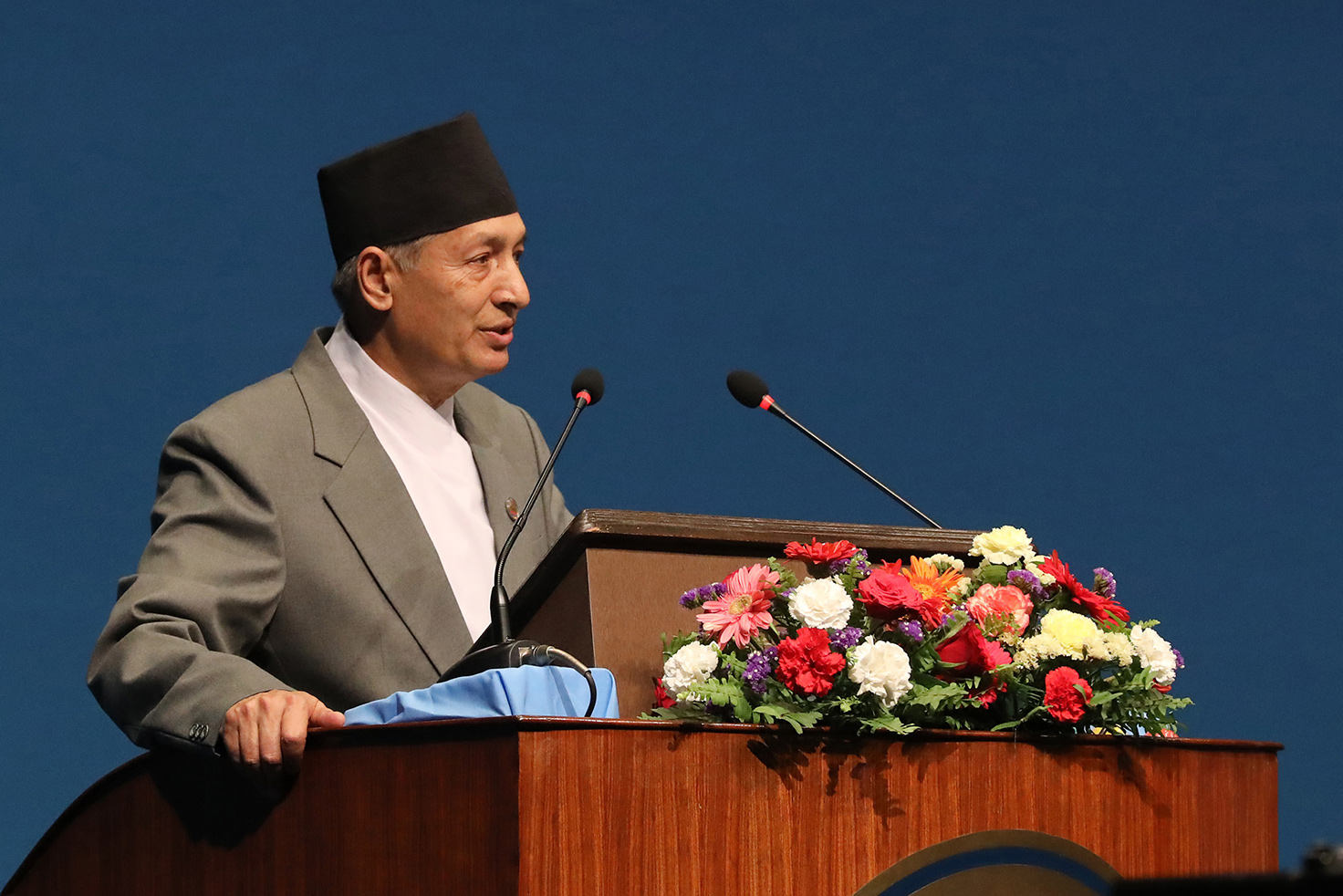
FINANCE MINISTER PRESENTS AN INADEQUATE BUDGET THAT CANNOT MEET THE RESPONSE REQUIRED BY THE PANDEMIC CRISIS
Finance Minister Dr. Yuba Raj Khatiwada presented the full budget for fiscal 2020-21 amidst the uncertainty of the coronavirus pandemic focusing on healthcare, employment generation, relief and rehabilitation of the economy shattered by the national and international stringent lockdown measures enforced by governments to stem the spread of deadly virus.
The fiscal budget 2020-21 is defined as: ‘a conventional budget during an unconventional situation’ according to former Prime Minister Dr. Baburam Bhattarai who also said, “The government has missed an opportunity of vital structural changes in the economy”.
The budget could have given relief on multiple fronts: to those who lost jobs including daily labourers, the hard-hit private sector to recover, and to expedite and complete mega infrastructure projects. However, the government’s ambition to achieve a growth rate of 7% looks distanced as the budget shows scattered priorities which will be difficult to execute.
Finance Minister Khatiwada has lowered the size of budget by Rs. 58.34 billion compared to the current fiscal year’s budget as he faced challenges in managing resources for budget financing. He has unveiled Rs 1474.64 billion’s budget.
Text: Pushpa Raj Acharya
In the next fiscal, Rs 889.62 billion will come from revenue, which is 60.33% of the budget. The government will mobilise 225 billion from domestic borrowing, Rs 299.5 billion from foreign loans and Rs 60.52 billion from foreign grants. However, it is likely that the government will face challenges in mobilising foreign loans and grants as per its ambitious target when countries across the globe are themselves coping with the pandemic to save lives and to revive their economies, shared Dr Shankar Sharma, former Vice Chairperson of the National Planning Commission. He further added that the government’s policy to borrow more from the domestic market will cause ‘crowding out’ impact in the private sector, meaning that the private sector could face lack of availability of adequate credit for investment which will dampen its growth.
The government will spend Rs 948.94 billion or 64.4% allocated for administrative expenses: salary of government employees, pensions and to provide grant. Likewise, 23.9% of the total budget will be spent on development works and 11.7% for repayment of debts and to chip in investment through public corporations. The government has lowered the recurrent expenditure by less than one per cent, however, capital expenditure or the fund mobilised in development works is lowered by 13.5% compared to the fiscal year 2019-20. Around 6.15% of the total budget will be spent in the health sector: for prevention, diagnosis and treatment of COVID 19 as well as to develop the quality of healthcare facilities in the federal, provincial and local levels. The FM has laid emphasis on healthcare of people to protect them from the coronavirus pandemic and extended insurance coverage worth Rs five lakhs and incentives to frontline health workers.
The Finance Minister has claimed that 1.42 million jobs will be generated from the execution of the budget and raft of concessions, relief has been provided to the hard-hit tourism sector, industries, SMEs among others through concessional financing schemes, tax/fees waiver, discounts in electricity charges, elimination of demand charges.
He further stated that the subsidy in chemical fertilisers, improved seeds, agriculture inputs will support enhancing agriculture productivity and lure youth into agro production and agro businesses. The government has announced a new scheme for the farmers namely ‘Credit Card for Farmers’, which is seemingly replicated from the successful initiative of the Indian government. In India, farmers can use such credit cards to purchase fertiliser, seeds, inputs among others from the seller through this card and pay back after harvest. “This will improve the situation of access to finance.” said FM Khatiwada.
There are some important announcements on agriculture to enhance productivity. Finance Minister Khatiwada has announced Rs 11 billion subsidy for chemical fertiliser. Around 200 storage facilities for agro products or godowns will be developed at the local level along with 78 wholesale agro market hubs across the country maintaining the provincial balance. The fiscal budget has announced to develop 250 pocket areas focusing on one special product at the local level.
Relief package and employment generation
The fiscal budget has announced subsidised credit for SMEs, tourism and agriculture along with other affected sectors. Along with the refinancing fund worth Rs 100 billion which is operated from the Nepal Rastra Bank, the FM has announced another 50 billion to extend credit at 5% interest rate for pandemic affected cottage, small and medium enterprises for their operation and salary expenses of staffers. Khatiwada has said that the fiscal budget extended raft of facilities, tax/fee waivers, discounts, subsidies to the private sector to shorten the time of the recovery. Apart from Rs 150 billion mobilised through refinancing and subsidised credit package, the fiscal budget 2020-21 has extended Rs 55 to Rs 60 billion to the private sector in the form of tax/fee waivers, discount in electricity bill, elimination of demand charges and subsidies, as per the FM. “The relief and recovery packages should not be homogeneous,” the Finance Minister reiterated, “Cash transfer, waiver, incentives, compensation, subsidised credit, subsidised insurance premium, withdrawal of penalty, tax/fee waivers, fair price shops are all part of the relief and recovery package.” The informal sector workers will get minimum wage as relief based on the contribution in works created by the government, those who do not contribute can appealed to the government and will get only one-fourth of the relief provided to those who work, either in cash or kind (food). The private sector is pessimistic about the budget, stating that it has largely ignored the challenges being faced by the private sector. The lockdown enforced by the government has crippled their cash-flow. “It would better if the government had shared the liability of paying salaries to workers during the lockdown,” said Shekhar Golchha, Senior Vice President of the FNCCI, “Waiver in electricity bills to the industries in off peak hours was already 48%, the government has increased marginal two percentage points and delivered a high sounding speech of 50% waiver in charges of off peak hours.”The relief and recovery package of the government is as follows:
The Finance Minister has targeted creating huge number of jobs from the execution of the budget. The government has reportedly focused on employment generation considering job losses in the domestic and foreign labour market. He has said that the execution of budget could generate 1.42 million jobs.Intergovernmental fiscal transfer
The federal government has transferred Rs 362.6 billion to the subnational government under different types of grant. The subnational government also receives funds from revenue sharing, which is 30% of the value added tax and internal excise. Revenue sharing funds are distributed equally to the seven provincial and 753 local governments. The federal government transferred Rs 145 billion as fiscal equalisation grant (Rs 55.19 to province and Rs 90.05 to local government); Rs 197.43 billion as conditional grant (Rs 36.35 billion to province and Rs 161.08 to local governments); Rs 9.96 billion as matching grant and Rs 9.97 billion as complementary/special grant. While presenting the budget in the parliament, Finance Minister Khatiwada has said that he has transferred sufficient funds without any reduction compared to Fiscal 2019-20 in consideration of the mounting need of resources to tackle with the coronavirus pandemic. He further said that strengthening federalism has been given utmost priority.Lack of austerity measures
One of the major deficiencies of the budget is that it sorely lacks austerity measures as the resources dry up. The government could have narrowed down its recurrent expenses through merging the ministries, departments, dissolving unnecessarily formed commissions, boards and authorities to lower administrative expenditure. It is also suggested to chop down the list of development projects, removing projects that have no significance and channelise the resource to priority areas linking it with production and employment generation. The federal government is being criticised for keeping unnecessarily expanded administrative structures against the theme of the federalism, where federal governments would be slim and public services delivered through the subnational government. A Public Expenditure Review Commission report submitted to the government one and half years ago presented ways to cut down around Rs 200 billion from the existing system. However, the Finance Minister has taken an approach of tokenism cutting down travel and meal allowances of government employees, contrary to the government’s previously initiated policy of incentivising civil servants for better output.Taxation and controversy
The fiscal budget 2020-21 has not made major changes in taxation as the government is forced to narrow down revenue collection target due to the progression and prolonged impact of the pandemic. The Finance Minister has raised excise and customs duty on electric vehicles (EVs) and electric equipment in contrast to the policy of the government to increase electricity consumption. The government has slapped 40% customs duty from the earlier 10% and also levied 30 -40% excise based on engine capacity. EV traders have said that this will discourage the EV market in the country. “The country will have surplus energy from this wet season, the government should have thought that EVs could be the best option to consume surplus energy,” said Suhrid Ghimire, President of Continental Trading. The government has also raised duty on induction heaters against the decision of the cabinet meeting after lockdown. The cabinet has decided to fully waive the duty on induction heaters, however the fiscal budget 2020-21 has slapped 5% duty on induction; the same as on sanitizers which is being used largely for the prevention from coronavirus. However, it has lowered the duty on chocolates, papad (papadum), hair oil, creams and conditioners. There is no logic behind slapping duty on sanitizers and lowering duty on chocolates. The fiscal budget has also hiked excise on liquor and tobacco products along with smart watches, sprays andperfumes, some iron products (GI wire, I-beam among others) sausage and frozen meats, pan masala and gutka. The budget has raised the excise from 5% to 15% on smart watches, levied 5% excise in aforementioned iron and steel products. The budget has raised Rs 40 per kg excise on pan masala and gutka, and 50 paisa on each stick of cigarette. Likewise, the government has increased the customs duty on petroleum products with Rs 10 per liter increase on petrol, diesel and kerosene. Henceforth, customs duty on each liter of petrol is Rs 25.20 and Rs 12 on each liter of diesel and kerosene.
Published Date: June 22, 2020, 12:00 am
Post Comment
E-Magazine
RELATED Feature


-1765706286.jpg)
-1765699753.jpg)

